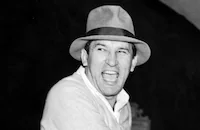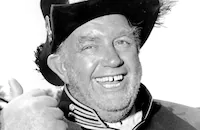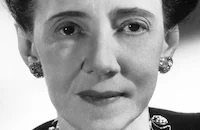Man Wanted

Brief Synopsis
Cast & Crew
William Dieterle
Kay Francis
David Manners
Una Merkel
Andy Devine
Kenneth Thomson
Film Details
Technical Specs

Synopsis
Lois Ames is devoted to her job as the editor of a magazine, and her wealthy husband Fred is equally dedicated to polo and parties. Lois's long hours drive her secretary to quit, and she replaces her with Tom Sheridan, who happens to be in the office demonstrating a rowing machine. Tom likes the work and continues to advance until he is indispensable to Lois. Ruth Holman, Tom's fiancée, is jealous of Tom's relationship with Lois and with some reason, as he is falling in love with her. In the meantime, Fred is having an affair with Ann Le Maire, a woman whose interests are closer to his own. Because he feels his love for Lois is hopeless, Tom quits his job and plans his marriage to Ruth. Lois tries to patch things up with Fred, but he suggests that they divorce instead. On Tom's last night, Lois keeps him working late. Ruth is furious and storms up to the office where Lois and Tom are dining. She threatens to tell Lois's husband about their relationship, which leaves the way clear for Lois to announce her pending divorce. Ruth breaks off her engagement to Tom, and he immediately asks Lois to marry him.

Director

William Dieterle
Cast

Kay Francis

David Manners

Una Merkel

Andy Devine
Kenneth Thomson

Claire Dodd

Elizabeth Patterson

Edward Van Sloan
Robert Greig
Junior Coghlan
Charlotte Merriam

Guy Kibbee
Virginia Sale
Betty Farrington
Crew

Film Details
Technical Specs

Articles
Man Wanted
By Violet LeVoit

Man Wanted
Forbidden Hollywood Collection Volume Four - Kay Francis, William Powell, Loretta Young, Joan Blondell & Others in FORBIDDEN HOLLYWOOD Volume 4
First up is the light-as-air romantic crime caper Jewel Robbery from 1932, which features Kay Francis in a role similar to her society girl/thief target role in the same year's Trouble in Paradise. Here she's teamed up with William Powell, her leading man in the previous For the Defense, Ladies' Man, and Street of Chance, with the tragic romance One Way Passage marking their final collaboration later that same year.
Things start off with a bang as a cocky demonstration of a new burglar alarm system turns out to be very fallible within minutes, followed by a saucy introduction to Francis as the wealthy Baroness Teri clambering out of a bubble bath. "Imagine having a husband like yours who would gladly spend a fortune just to make you happy" remarks her best friend Marianne (Helen Vinson), but Teri is bored with her life and longs for a little excitement to shake things up. That comes in the form of a suave burglar (Powell, of course), who has his eye on a valuable diamond Teri's just received and tosses out lines like "Did anyone tell you your eyes are like sapphires?" Of course, it's only a matter of time before his intricate scheme takes a romantic turn.
A fitting opener for this set, Jewel Robbery is both slick and shiny and far more daring than the Hays Code-era caper comedies to come. Powell's method of softening up entire rooms of potential victims with "funny" cigarettes that cause people to giggle and wake up "with an enormous appetite" will be enough to delight fans of Reefer Madness, and the whole film has a deliciously amoral atmosphere of Viennese decadence. The similarities to Ernst Lubitsch are obvious, of course, but this is really a Dieterle film all the way including an expressionistic nocturnal climax across the rooftops of Vienna that wouldn't be out of place in a Universal monster film. The final shot is deliciously surprising as well, with Francis breaking the fourth wall in as charming a manner as possible. The film elements here are in fine shape, with very few blemishes and an satisfying replication of the glossy cinematic sheen familiar from some of the other Powell/Francis films. The theatrical trailer is also included, though it barely conveys any idea at all about the content of the film itself.
Powell and Dieterle pop up again for the same year's Lawyer Man, a far more dramatic portrayal of the legal profession circa '32 complete with rat-a-tat dialogue, sexy innuendo, and scheming criminals. Good guy Anton Adam (Powell) is a struggling lawyer on the Lower East Side with enough street smarts to whack a misbehaving, chair-wielding client in the jaw. His tenacity gets gets him a fancier new uptown office for him and his dedicated secretary, Olga (Joan Blondell), but his prosecuting of prominent racketeer John Gilmurry (David Landau) endangers his trip up the professional ladder when Gilmurry decides to get even in and outside the courtroom.
Apart from a few leering shots of ladies' legs and some belching, there isn't anything too scandalous about this one. Instead, Lawyer Man is primarily of interest for its portrayal of contrasting sides of New York: one a lower class street teeming with icemen on horse-drawn carriages, the other a stifling maze of offices and buzzing telephones. Lawyer movies were popular properties at the time, and this one is rather par for the course as Powell charts the dangerous waters of the legal system along with his possibly deceptive new partner, Granville Bentley (Alan Dinehart), and his predatory sister (Vinson again). The subject matter would have easily turned into a crime film, but the antagonism between the male leads in the film remains oddly civilized and even playful, including a mid-film twist or two that threaten to compromise our hero's character once and for all. Blondell is a joy to watch as usual and essentially wipes all the other women off the screen, though it's a more chaste and restrained part than usual for her as she essentially moons over a man she can't have through most of the running time. Once again the transfer from solid film elements has a few scratches here and there but nothing too distracting, and the black levels look very rich and impressive here. Again the trailer is the sole extra, devoted mainly to a bit of Powell speechifying that makes the film look much more somber than it actually is.
The third disc plays a bit of musical chairs as this time it's Dieterle and Francis joining again for Man Wanted. Leading man duties this time go to David Manners (best known for the Universal horror films Dracula, The Mummy, and The Black Cat) as Tom, a go-getting young man who tries to sell a rowing machine in the office of magazine editor Lois Ames (Francis, once more an unsatisfied society wife in sparkly outfits). Their banter ("How strong is your back?") leads to immediate sparks, and she brings him on as her personal assistant. (Another Dracula star, Edward Van Sloan, also pops by at the beginning in a tiny role.) Romantic complications ensue involving Tom's fiancée (Una Merkel), Lois' husband (Kenneth Thomson), and his potential mistress (Claire Dodd), as Francis gets to show off an increasingly extreme array out of outfits including a huge summer hat that would topple over a lesser woman.
In keeping with a pre-code romantic comedy/drama, there's plenty of fast and loose morality here by later Hollywood standards which just adds to the entertainment value. It's all genial and surprisingly humane to all of the characters, with Andy Devine also providing able comedic support. However, the main pleasures here are all visual thanks to cinematographer Gregg Toland, who would go on to legendary status with such films as Citizen Kane, Mad Love, Wuthering Heights, and The Grapes of Wrath. This marked his only collaboration with Dieterle, but the results are beautiful and sometimes truly jolting, such as a bizarre pullback involving a Ballyhoo magazine cover in bed. The camera is almost constantly roving here, resulting in the most modern-looking and aesthetically rewarding film out of the set. Again the trailer is fairly vague and mainly plays up Francis in her first Warner Bros. role ("Her dashing, dazzling beauty... Her devastating charm... Spicy! Snappy! Sparkling!"). She's excellent here as usual, though it's also worth noting that the often undervalued Manners is also far more relaxed and charming here than usual in a performance that indicates what he could have done had he not given up acting four years later.
Though it boasts the most promising title of the four, the tamest one is actually on the fourth disc. Also from 1932, They Call It Sin brings back Manners in a secondary role as Jimmie Decker, a salesman who becomes infatuated with a fresh-faced Loretta Young as small-town Kansas church organist Marion Cullen. Their afternoon idylls (first at a soda shop, then rowing on a lake) sends her following him back to New York, where it turns out he's engaged to another woman. She decides to continue her musical career via a questionable producer (Louis Calhern), but then Jimmy's surgeon buddy Dr. Tony Travers (George Brent) enters the picture as well. Both Merkel and Vinson return, with the former getting some of the best moments as Young's dancer roommate (including, appropriately, the exuberant final shot).
Despite the obvious lack of salacious content, They Call It Sin will appeal to fans of the period with its solid amount of star power, plentiful plot turns packed into barely over an hour, and efficient direction by Thornton Freeland, who would helm the far more famous Flying Down to Rio one year later. This is the only film without a trailer, but as with the others, the transfer is generally excellent with better contrast levels than most TV broadcasts and just a few scuffs and scars betraying its vintage. All in all, it's an upbeat, elegant, and sometimes naughty quartet worthy of the prior three entries in this excellent series.
For more information about Forbidden Hollywood Collection Volume 4, visit Warner Home Video. To order Forbidden Hollywood Collection Volume 4, go to TCM Shopping.
by Nathaniel Thompson
Forbidden Hollywood Collection Volume Four - Kay Francis, William Powell, Loretta Young, Joan Blondell & Others in FORBIDDEN HOLLYWOOD Volume 4
Quotes
Trivia
Guy Kibbee (Devins) and Virginia Sale (Miss Winkler) are listed in studio records for acting in this movie, but were not seen. Robert Greig is credited onscreen as Harper, a role played by Elizabeth Patterson.
Notes
The film's pre-release titles were A Dangerous Brunette, Working Wives and Pleasure First. According to Film Daily, the script was adapted by Robert Lord from an anonymous story. This was Kay Francis' first film for Warner Bros.















